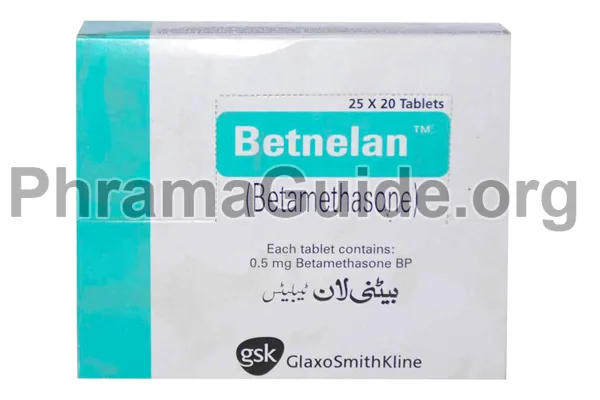Betnelan is a systemic corticosteroid, and it is typically prescribed to treat a variety of conditions characterized by inflammation, immune system dysfunction, or excessive swelling. Like all medications, Betnelan can have side effects. Here are some common and less common side effects associated with the use of Betnelan.
Common Side Effects:
- Increased Appetite: Corticosteroids like Betnelan can often lead to an increased appetite and potential weight gain.
- Insomnia: Some individuals may experience difficulty sleeping or insomnia when taking Betnelan.
- Mood Changes: Mood swings and emotional changes are common side effects, including feelings of irritability and nervousness.
- Fluid Retention: Betnelan can lead to water and salt retention, resulting in swelling or edema, especially in the extremities.
- Increased Blood Pressure: Elevated blood pressure can occur as a result of Betnelan use, especially with higher doses or prolonged treatment.
- Gastrointestinal Issues: Common digestive side effects include indigestion, stomach discomfort, and even the development of gastric ulcers in some cases.
- Cushing’s Syndrome Features: Long-term or high-dose use can lead to the development of certain features associated with Cushing’s syndrome, such as a “moon face” appearance, buffalo hump (extra fat on the upper back), and stretch marks.
- Increased Blood Sugar Levels: Betnelan can raise blood glucose levels, and it may require adjustments in diabetes medications.
Less Common Side Effects:
- Osteoporosis: Long-term use of Betnelan can lead to bone weakening and an increased risk of osteoporosis and fractures.
- Adrenal Suppression: Prolonged use can suppress the function of the adrenal glands, potentially leading to adrenal insufficiency when the medication is discontinued.
- Cataracts: In rare cases, Betnelan may contribute to the formation of cataracts in the eyes.
- Glaucoma: Increased intraocular pressure and the development of glaucoma have been reported in some individuals using Betnelan, particularly when administered for extended periods.
- Infections: Betnelan use can suppress the immune system, making individuals more susceptible to infections. Existing infections may also worsen during treatment.
- Psychological Effects: Some people may experience psychological effects, including mood swings, anxiety, or even psychiatric symptoms like psychosis.
- Skin Changes: Betnelan use can lead to changes in skin appearance, including thinning, bruising, and a higher risk of skin infections.
- Menstrual Irregularities: Women may experience irregular menstrual cycles while taking Betnelan.

What is Betnelan?
Betnelan is one of the leading brands of Betamethasone, manufactured and marketed by GSK Pharma Pakistan.
Betnelan : Available Formulations and Strengths
Presently, Betnelan is available in Tablet Form
Betnelan Tablets : 0.5mg Strength
What Are The Possible Drug Interactions of Betnelan?
- Other Corticosteroids: Concurrent use of multiple corticosteroids, including Betnelan, can increase the risk of side effects without providing additional therapeutic benefits. Avoid using multiple corticosteroids simultaneously.
- Nonsteroidal Anti-Inflammatory Drugs (NSAIDs): NSAIDs can increase the risk of gastrointestinal side effects when taken with Betnelan. Your healthcare provider may need to adjust the dosage and monitor for side effects if you are using both types of medications.
- Anticoagulants (e.g., Warfarin): Betnelan tablets can affect blood clotting and potentially interact with anticoagulants like warfarin. Your healthcare provider may need to adjust the dosage of the anticoagulant and monitor your blood clotting parameters closely.
- Antidiabetic Medications: Betnelan can raise blood glucose levels, so if you’re taking medications for diabetes, your healthcare provider may need to adjust the dosage of your antidiabetic medications.
- Cyclosporine: Concurrent use of Betnelan and cyclosporine, an immunosuppressant, can increase the risk of adverse effects. This combination should be used with caution and under the guidance of a healthcare provider.
- Vaccines: Corticosteroids like Betnelan can weaken the immune system, potentially reducing the effectiveness of vaccines. It is advisable to discuss vaccination plans with your healthcare provider while taking Betnelan.
- Certain Antibiotics: Some antibiotics, such as rifampin and tetracycline, can reduce the effectiveness of corticosteroids like Betnelan. In some cases, a higher corticosteroid dose may be required.
- Antifungal Medications: Some antifungal medications can interact with corticosteroids like Betnelan, altering their effects. Your healthcare provider will monitor your condition closely and may adjust the dosage of either medication.
- Strong CYP3A4 Inhibitors and Inducers: Betnelan is metabolized by the CYP3A4 enzyme. Medications that are strong CYP3A4 inhibitors (e.g., ketoconazole) or inducers (e.g., rifampin) can affect the metabolism and effectiveness of Betnelan.
- Potassium-Lowering Drugs: Some medications used to lower potassium levels in the body, such as diuretics (e.g., furosemide), can interact with Betnelan and increase the risk of low potassium levels (hypokalemia).

Leave A Comment